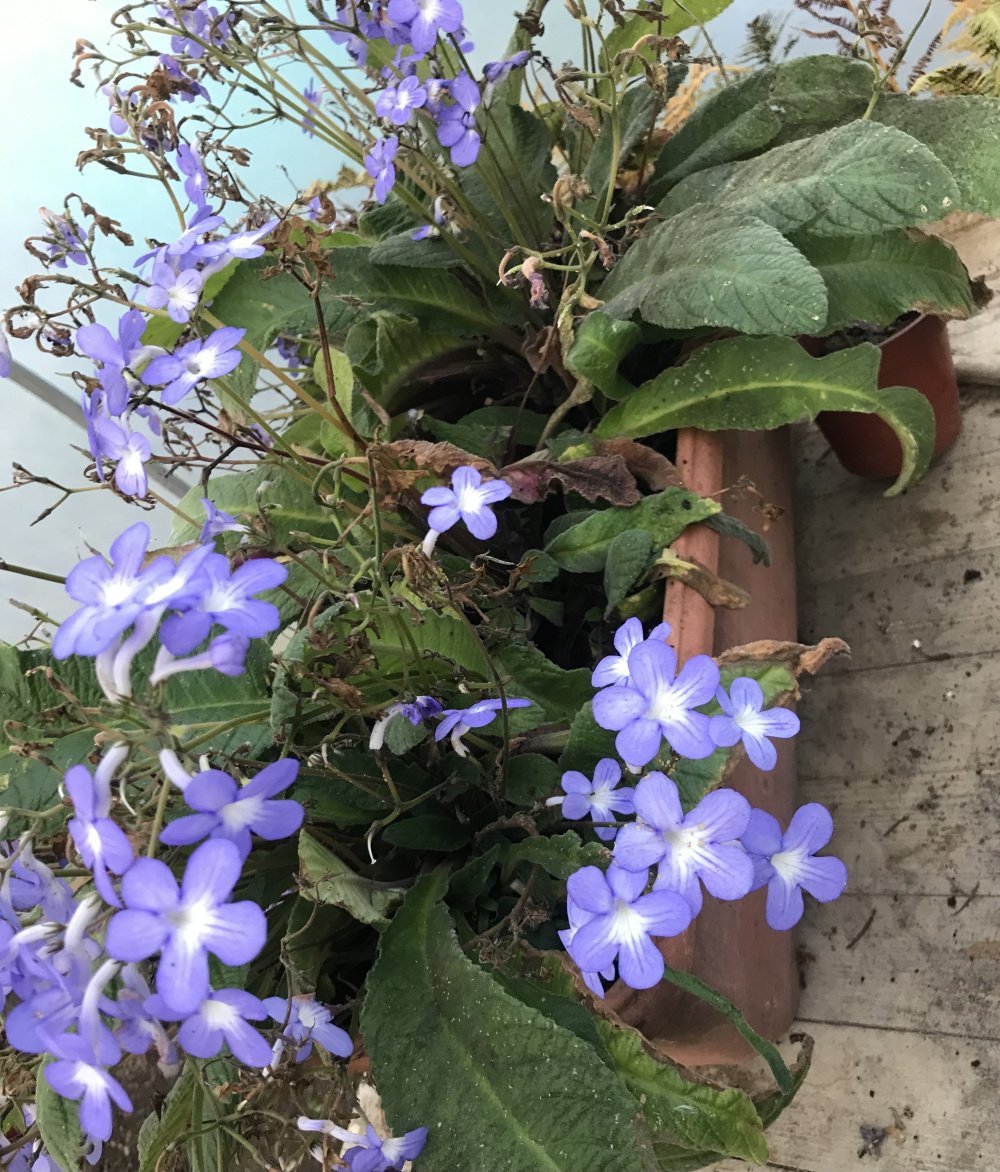This Forum will close on Wednesday 27 March, 2024. Please refer to the announcement on the Discussions page for further detail.
What to do with these streptocarpus
This is a tub with 3 streptocarpus in it. They were originally in their own pots on the west-facing kitchen windowsill and going slowly downhill. Following advice on T.V. that they love being under greenhouse staging, I decided to put them in one big tub (less likely to dessicate in one hot day), and put them under a table in the polytunnel, where they duly went berserk and looked lovely. They spent last winter back in the house, on a different west-facing window, and were miserable and  a bit mouldy. They recovered over the summer when back out under their table again. We only have a couple of windowsills wide enough for any kind of pot, and these are both west-facing. Just wondering what to do this winter?
a bit mouldy. They recovered over the summer when back out under their table again. We only have a couple of windowsills wide enough for any kind of pot, and these are both west-facing. Just wondering what to do this winter?
 a bit mouldy. They recovered over the summer when back out under their table again. We only have a couple of windowsills wide enough for any kind of pot, and these are both west-facing. Just wondering what to do this winter?
a bit mouldy. They recovered over the summer when back out under their table again. We only have a couple of windowsills wide enough for any kind of pot, and these are both west-facing. Just wondering what to do this winter? Carmarthenshire (mild, wet, windy). Loam over shale, very slightly sloping, so free draining. Mildly acidic or neutral.
0

Posts
I keep all of mine (“Polka-Dot Purple”) in individual small pots indoors and have been dividing from one plant bought in 2021. I have five pots — the ones in the picture below, currently sitting on the kitchen island where I do my deadheading — in a row on a south facing windowsill, which to be honest is a bit too much sun for them but I like them there. I have other pots that do well in a north facing window. Having them in small pots means I can use one, two or more to fit the available space on any window.
I’ve found that dividing, as opposed to just plonking a plant from its existing pot into a slightly larger one, works best for health and flowering.
I guess though that you would want to keep your existing tub?
In any case here’s what I would do:
1) Tip all the plants out of the tub and discard the compost. Probably all the nutrients have gone by now, the plants are overcrowded, and you wouldn’t want any mould spores hanging around.
2) Working on each main clump, a) cut off individual spent flowers, if the stalk still has other good flowers; b) cut off spent flowering stalks at the base; c) cut or pull off brown/yellowing leaves; then d) gently separate out individual small clumps to replant. With what looks like a lot of plant material that you have there, and perhaps if you don’t have enough containers, you could either put the smallest/weakest plantlets in the compost/green bin or pot them up in plastic pots to give away. I would only keep the healthiest looking clumps.
3) Working quickly so the new plants don’t spend too much time sitting around, I would repot them into clean pots with fresh compost.
4) Top off the pots with a layer of decorative grit (helps against fungus gnats, which used to be a problem in the early days but are now long gone) and water each pot thoroughly, making sure the water drains through. I only water next when the leaves are wilting, as the root systems are often small and take a while to get going in terms of absorbing water.
Newly potted streptocarpus plants can look a bit sad at first, with spindly leaves and likely no flowers, but they generally grow to become robust specimens over the next 3 to 6 months.
As a final tip, I only use rainwater on mine, and add African Violet Focus liquid fertiliser (according to instructions) every other watering from spring to late summer — more spoiling of houseplants!